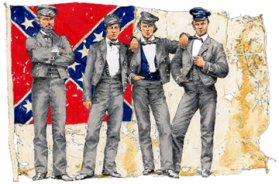Let’s compare and contrast.
Here’s Tom DiLorenzo at LewRockwell.com Blog
George Mason University Ph.D. candidate (public policy program) Phil Magness has had this terrific article published in the Journal of the Abraham Lincoln Association. It shows that, until his dying day, Dishonest Abe was hard at work trying to organize the colonization (i.e., deportation) of all the freed slaves.
— Tom DiLorenzo, LewRockwell.com Blog (2008-04-08): The Latest Scholarship on Lincoln’s Colonization
Fetish
Here’s George Mason University Ph.D. candidate (public policy program) Phil Magness, in this terrific article published in the Journal of the Abraham Lincoln Association:
Constrained by the limitations of written evidence, inquiry into Butler’s account becomes necessarily
speculative. Given the general’s probable exaggerations, one conceivable scenario involves the
conversation turning to the subjects of racial conflict and colonization, with Lincoln indicating his
willingness to receive Butler’s suggestions. Such a conversation would fall short of the specific
project Butler describes or Lincoln’s choice of Butler to complete the task, though it indicates the
possibility, and perhaps even likelihood, that Lincoln still entertained colonization ideas. Many unlikely
parts of the conversation appear in Butler’s quotations of himself, rather than those attributed to
Lincoln. The use of black troops to establish a colony, the canal component, and the policy itself are
all expressed as ideas of Butler, which I will suggest to you, Mr. President.
Lincoln’s only
reaction, there is meat in that, General Butler,
is far from espousal of the plan’s particulars,
though it would indicate a more likely scenario in which Lincoln patiently received and considered
Butler’s suggestions.
The present inquiry set out to provide a firmer basis for evaluating Butler’s colonization anecdote by
resolving the issue of its reported timeline. Though established in date, the anecdote leaves many
additional questions unanswered and provides room for further examination of an underexplored area
of Lincoln’s presidency. As the full conversation between Butler and Lincoln was known only to its
participants, one of them assassinated only three days later and the other writing of it twice several
decades after the fact, a comprehensive and unbiased record of its events is unlikely ever to
emerge. What is certain is that a private meeting in 1865 between Butler and Lincoln occurred. The
details of this meeting, as conveyed by Butler, exhibit duly acknowledged signs of embellishment and
the distorting effects of their distance from the event itself. Beginning with the meeting’s known
date though, the two Butler accounts deserve greater attention than they have received. Sufficient
evidence exists to merit additional consideration of Lincoln’s colonization views later in life, and tends
to caution against the conclusiveness that many scholars have previously attached to the view
that Lincoln fully abandoned this position. The Butler anecdote remains an imperfect example, yet
some of its more plausible details may indicate that Lincoln retained an interest in colonization, even
if limited, as late as 1865.
— Phil Magness, Journal of the Abraham Lincoln Association 29.1 (Winter 2008): Benjamin Butler’s Colonization Testimony Reevaluated
Magness’s article shows nothing like what DiLorenzo claims it to show. Nor does it claim to show anything like what DiLorenzo claims it to show. What it shows (with a great deal of care and interesting detail) is that a common argument, based on problems with Butler’s timeline, for decisively rejecting a particular piece of evidence for the claim that Lincoln continued to advocate deportation and colonization of free blacks after 1863, is ill-founded, because, while Butler could not have met with Lincoln at the time he claimed in his memoirs (published decades after the fact), he did meet privately with Lincoln not long after, and a little-known second account that Butler gave of his meeting with Lincoln helps clarify which parts of the anecdote are more trustworthy and which parts are less trustworthy. Magness says that the evidence leaves open the possibility that Butler is telling the truth, although encrusted with misremembering and possibly deliberate exaggeration. Unfortunately, the facts being what they are, the anecdote leaves many questions about Lincoln’s final views unanswered, and many questions that it may be impossible ever to answer. But it remains possible that Lincoln was still interested
in, though apparently not actively working on, small-scale colonization schemes near the end of his life. Scholars who reject the possibility, and Butler’s testimony, out of hand need to reconsider their views, and Butler’s two accounts of the meeting deserve closer attention.
DiLorenzo would have us believe an entirely different claim — that this article decisively demonstrates that not that a particular piece of evidence should not be rejected out of hand, but rather that a particular conclusion on Lincoln’s views must be accepted, and that it decisively demonstrates not merely that it’s possible that Lincoln idly believed in colonization and patiently received and considered
plans for small-scale projects while doing nothing to further them, but that he was actively pursuing colonization schemes up to the end of his life. None of these claims are anywhere to be found in the article.
There are already plenty of certain reasons to condemn Abraham Lincoln as a shameless opportunist, a dictatorial warlord, and, yes, a white supremacist and segregationist. There is no need to jump on any and every opportunity to manufacture new reasons, or to distort scholars’ claims so as to depict the case as being much stronger than the facts warrant, not to mention much stronger than the scholar in question ever claimed it to be. This mad-dog polemical style and partisan misrepresentation of arguments serve nobody.
Further reading:

 Here’s a detail from a piece of marketing flotsam that I found recently attached to the advertising section of some magazine or another: an insert hawking the
Here’s a detail from a piece of marketing flotsam that I found recently attached to the advertising section of some magazine or another: an insert hawking the